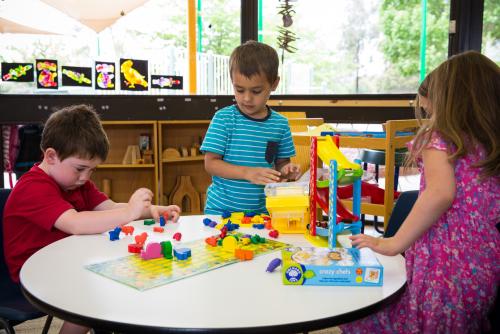The education debate’s missing piece

Early Childhood Australia CEO, Samantha Page, examines the current state of early childhood education and care services in Australia and shares her thoughts on what is needed to secure a brighter future.
The Gonski review has prompted a national conversation about the importance of education and how best to use funding today so generations of children will benefit. This debate is about values and what we want for our children’s future. It is also about economics. For Australia to thrive in the long term we need citizens who are smart, adaptable and creative.
The missing piece in this discussion about education is the importance of early learning.
Decades of research has demonstrated that the learning experiences a child has between the ages of zero and five will have a huge impact on their future success. This will shape their social and emotional health, cognitive development and capacity for lifelong learning.
So how does Australia perform when it comes to the quality of early childhood education and care?
Many people would be surprised to learn that Australia is currently ranked just 28 of 45 OECD countries on the provision of early childhood education and care. New Zealand is ranked ninth and doing much better than Australia when it comes to measures of availability, affordability and quality.
 It might also be a surprise to learn that one in four Australian children show poor development at the time of school entry when measured on the Australian Early Development Index (AEDI).
It might also be a surprise to learn that one in four Australian children show poor development at the time of school entry when measured on the Australian Early Development Index (AEDI).
This isn’t the whole picture, Australia has some of the best early childhood services in the world. But there is a lack of consistency across the sector that’s letting our children down.
For too long early childhood education and care services in Australia have operated without a set of quality standards that all services must abide by.
The National Quality Framework (NQF) introduced across Australia at the beginning of 2011 is already making headway in addressing this problem. The NQF standards cover staff to child ratios, educator qualifications, health and safety, requirements for the physical environment, education programming, relationships with families and service leadership.
The standards provide a basis for ensuring rich play experiences for children, structured learning environments and quality one-on-one interactions between staff and children. In these situations children are given a context for learning through which they can organise and make sense of their social worlds as they engage actively with people and objects.
 Right now there are services that have been delivering this sort of quality for years. But there are also other service providers that, despite doing the best they can, just don’t have the resources to deliver quality childcare.
Right now there are services that have been delivering this sort of quality for years. But there are also other service providers that, despite doing the best they can, just don’t have the resources to deliver quality childcare.
As the NQF is rolled out each service will be measured against the standards and the results will be made available to families.
We know – and we’ve known for some time – there are a diverse range of childcare methods in various communities across the country, but a national standard will allow us to address this systemically for the first time. We will be able to identify services in need of support and provide practical help to improve them.
Implementing the quality reforms does have a cost and more investment is needed to keep services affordable for families. Investment in early education needs to be part of our national discussion about securing a bright future for our children.
Every child deserves the best start in life – this is the goal of the National Early Development Strategy. It’s a goal that is yet to be realised but is, in theory, supported by State, Territory and Federal Governments.
Further investment in early childhood education and care is critical and we need to maintain a commitment to national quality reforms in order to secure our children’s future.
Samantha Page is the CEO of Early Childhood Australia (ECA) and has worked in the non-government sector for 20 years across roles encompassing executive management, management consulting, social policy analysis, advocacy and the delivery of human services. ECA was established in 1938 and works with Government, early childhood professionals, parents, other carers of young children, and various lobby groups to advocate to ensure quality, social justice and equity in all issues relating to the education and care of children from birth to eight years
Samantha Page is the Chief Executive Officer of Early Childhood Australia (ECA). Early Childhood Australia is the peak advocacy body for children under eight, their families and early childhood professionals. Sam has worked in a variety of positions within in the community, public and private sectors, spanning service delivery and service management, policy development, change management and public administration. She has worked closely with community sector leaders, Members of Parliament, senior bureaucrats in Federal Government agencies as well as peak bodies, research institutes and universities. Sam’s current appointments include the Board of the Australian Institute of Health and Welfare.













iakovos
March 4, 2013 at 11:08 am
Another missing piece to education
Samantha Page has already put forward a very valid and important argument about early childhood development. Well done Samantha. However as students enter Primary School they need something to be taught at every level and at every subject. Something that will make their lives a whole lot easier, something that will eventually reduce police numbers in the streets and reduce crime rates.
The thing that education needs more than anything else is teaching students the primary thing… RESPECT. Children need to be approached on this at a very early age. Too often children lose this opportunity at home because their parents don’t know how to teach them respect, or because they’re left in foster care, broken families etc. Society and education have a great role to play here.
In this country respect is not being expanded enough in class and the results of lack of respect is not being made real to students. All too often we teach them maths, science, language but respect comes secondary and in many cases is non-existent.
If the young student is not taught respect at an early age, we have virtually missed the boat after Primary School. They will not respect their family, their friends, their neighbors, society, the environment, or even themselves. And that’s where it should start, respecting oneself.
If respect and reverence becomes part of a early childhood learning in 15 years we can and will see the results. Its fine and commendable to defend the rights of children, but at the same time we need to defent rights from misbehaving children and later young adults in order to have a balance in society. This is where any society’s make or break point is on crime, law and order, security.
Thank you for the opportunity to express this opinion.